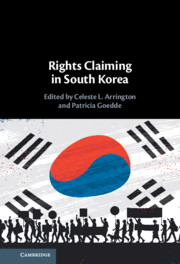Book contents
- Rights Claiming in South Korea
- Rights Claiming in South Korea
- Copyright page
- Dedication
- Contents
- Contributors
- Acknowledgments
- Abbreviations
- Introduction Rights in Action
- Part I Rights in Historical Perspective
- 1 Legal Disputes, Women’s Legal Voice, and Petitioning Rights in Late Joseon Korea
- 2 Defying Claims of Incompetence
- 3 “Equal” Second-Class Citizens
- Part II Institutional Mechanisms for Rights Claiming
- Part III Mobilizing Rights for the Marginalized
- Part IV Shaping Rights for New Citizens and Noncitizens
- Conclusion Findings and Future Directions
- Index
- References
1 - Legal Disputes, Women’s Legal Voice, and Petitioning Rights in Late Joseon Korea
from Part I - Rights in Historical Perspective
Published online by Cambridge University Press: 17 April 2021
- Rights Claiming in South Korea
- Rights Claiming in South Korea
- Copyright page
- Dedication
- Contents
- Contributors
- Acknowledgments
- Abbreviations
- Introduction Rights in Action
- Part I Rights in Historical Perspective
- 1 Legal Disputes, Women’s Legal Voice, and Petitioning Rights in Late Joseon Korea
- 2 Defying Claims of Incompetence
- 3 “Equal” Second-Class Citizens
- Part II Institutional Mechanisms for Rights Claiming
- Part III Mobilizing Rights for the Marginalized
- Part IV Shaping Rights for New Citizens and Noncitizens
- Conclusion Findings and Future Directions
- Index
- References
Summary
Based on a neo-Confucian vision that the monarch’s mandate relied on listening to his people’s grievances, the Joseon state (1392–1910) empowered subjects regardless of gender or status to petition the sovereign regarding grievances not rectified in lower courts. While Joseon-era women are usually considered to have been silent subjects outside the home, their petitioning activity shows that women, irrespective of their status, had the same legal rights as men to appeal grievances to the state. This chapter parses women’s linguistic practices in claims-making to show how their petitioning rights complicated gender dynamics of Confucian society. The gender hierarchy was reinforced through women’s narrative strategy as they appropriated discourses of domesticity. At the same time, I posit that women as legal agents were re-gendering legal identity by constructing a sense of personhood via their petitioning. Through gendered claims, women struggled to defend not only themselves and their sense of morality but also their entire family.
Keywords
- Type
- Chapter
- Information
- Rights Claiming in South Korea , pp. 21 - 42Publisher: Cambridge University PressPrint publication year: 2021

